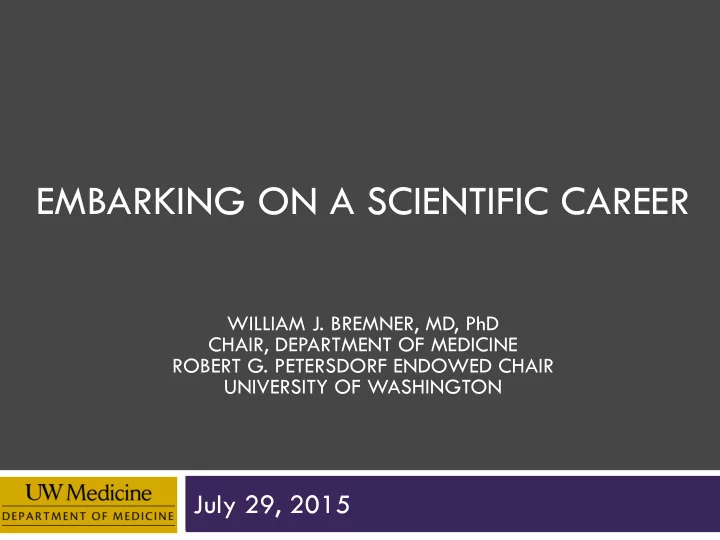

EMBARKING ON A SCIENTIFIC CAREER WILLIAM J. BREMNER, MD, PhD CHAIR, DEPARTMENT OF MEDICINE ROBERT G. PETERSDORF ENDOWED CHAIR UNIVERSITY OF WASHINGTON July 29, 2015
A Few Things About Myself Some General Observations/Advice Questions/Discussion
Most Important YOUR MENTOR!! Successful Investigator - Publications, Funding, Local & National Reputation Must have a track record of success with previous trainees - trainees publish - trainees get funded - trainees succeed in research
Mentoring Group Additional methodologies Various ages/experiences Basic/translational/clinical
Lab Facilities/environment Space, equipment, staff Other trainees Clinical Database – availability Patients numbers, access IRB/FDA approvals
Research Having time enough to think about something in detail - Have new ideas/questions Finding out something that no one knew before (even if it is very small!) Uncommon: a specific research question/hypothesis chosen before starting in the lab Focus (vs shotgun) Must be interesting and feel important to be sustaining
Yearly Goals Year One Identify and bond with mentor(s) Check track record of mentees and funding of mentor With mentor, identify ongoing studies that can be “joined” and consider IRB submissions for studies in second year Consider writing a review paper in area targeted for research Caution against setting up a new lab method in first year or two
Year Two Conduct research studies Initiate new studies Submit abstract(s) for regional, national meetings Training in statistics, study design Write paper(s) as soon as data available Maybe middle author initially, then first author Consider NRSA application Practice speaking and writing Get local criticism
Year Three Continue and initiate additional research Publish (first author) initial research Additional middle author papers Submit NRSA, K award, foundation applications
Year Four Additional first and middle author research papers. Reviews and chapters usually not worth the time spent K award and foundation or pharma support for salary Looking to Acting Instructor or Assistant Professor appointment
By end of year four (definition of success / victory!) 5-10 papers, most as first authors, in good journals and K award Junior faculty appointment
Fellowship Salaries: Sources ACGME Fellows: Medical Center Stipends Training Grants Division Funds Non ACGME Fellows: Training grants Mentor’s research funding Foundations
Institutional Research Training Grants T 32 Institutional National Research Service Award Institutional K awards KL-2 K-12’s
Individual Fellowships F 32 Postdoctoral Individual National Research Service Award F 33 National Research Service Awards for Senior Fellows
How to Support Salary in Transition from Fellow to Academic Position Apply for K awards Foundations Request support on mentors’ grants Collaboration with other faculty
K-awards K08 Mentored Clinical Scientist Development Award Development of independent clinical research scientist. 3-5 yrs; 75% effort. KL2 Mentored Clinical Scientist Development Program Award Support to institution for the development of independent clinical scientists. 5 yrs; 75% effort; initiated by the educational institution. K23 Mentored Patient-Oriented Research Career Development Award Development of the independent research scientist in the clinical arena. 3-5 yrs, 75% commitment. K99/R00 NIH Pathway to Independence (PI) Award Facilitate receiving an R01 award earlier in a research career and to assist investigators in securing a stable research position during the critical transition stage of their career. K01 Mentored Research Scientist Development Award New direction for PI. Development of the independent research scientist. 3-5 yrs; 75% effort.
Goals for Independent Funding R-01 – Classic benchmark P – Program Project and Center Grants – Project PI U – Interactive grants or PPG’s - PI VA – Merit Award – PI
Should I “go or stay”? Switching institutions Positive: established independence–acquired new perspectives and methodologies Negative: dead time for move, start-up, and establishing new collaborators
Scientist Research accomplishments Value of contributions First and last authored publications in strong, peer- reviewed journals Independent grant support Eventual independence from mentor Eventual national reputation Focus: thread of discovery Teaching, Clinical, Leadership, Mentorship
Teaching Mentorship Seek out excellent teachers to observe and model. Very gratifying A key part of why some choose to stay in academics Not so well supported financially
Leadership Dissatisfaction with things as they are Why don’t we do X ? The feeling that you can do something better than others A key talent is being able to pick excellent trainees, faculty and staff - people have to be given responsibility and resources Requires ability to tolerate some failures in yourself and others
Academics Clinical/Research/Teaching/Leadership Can determine individual balance Can vary over one’s career Varied life/challenges/opportunities Travel Generally lower incomes than practice or biotech/pharma/practice
Research Fellowships are a gateway to great career opportunities Especially academics But also practice, biotech, and others Pick successful mentors and pick important questions Enjoy the time Be challenged and be challenging
“Find what you enjoy doing and pursue it with focus, discipline, and vigor. Be mindful of the matrix organization in which you work (research lab, department, hospital, professional organizations, etc.), network and establish constructive collaborations. Seek out mentors, besides your research PI, who can provide objective, supportive and mature advice about your career development. Establish a positive, respectful relationship with your boss. Articulate career goals and on a yearly basis review your goals and progress toward them with your boss and mentors. Don’t lose sight of your family. And, importantly, have fun and enjoy the ride!” Elizabeth G. Nabel Former Director of National Heart, Lung and Blood Institute Current President of Brigham and Women’s Hospital The Journal of Clinical Investigation 120: 2251, 2010
Key Values Honesty/Integrity/Cooperation/Hard Work Communication -”Overdo” it somewhat Do not “talk behind peoples back” “The secret to success in patient care is caring for the patient.” - similar in all areas – have to have a true interest in the welfare/success of others
Recommend
More recommend